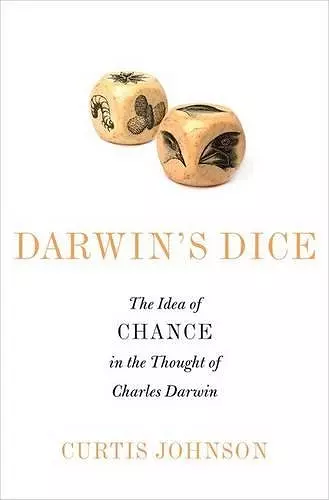Darwin's Dice
The Idea of Chance in the Thought of Charles Darwin
Format:Hardback
Publisher:Oxford University Press Inc
Published:23rd Oct '14
Currently unavailable, and unfortunately no date known when it will be back

For evolutionary biologists, the concept of chance has always played a significant role in the formation of evolutionary theory. As far back as Greek antiquity, chance and "luck" were understood to be key factors in the evolution of the natural world. Emphasizing chance is an entire way of thinking about nature, and it is also one of the key ideas that separates Charles Darwin from other systematic biologists of his time. Studying the concept of chance in Darwin's writing reveals core ideas in his theory of evolution, as well as his reflections on design, purpose, and randomness in nature's progression over the course of history. In Darwin's Dice: The Idea of Chance in the Thought of Charles Darwin, Curtis Johnson does exactly that. He examines the work of Darwin in terms of his views on randomness and chance, and how the views changed as his work progressed. Randomness was a focal point for Darwin, and pursuing it as a theme helped significantly transform his research. Darwin's Dice shows us how Darwin defined "chance," and explores Darwin's influential architect metaphor in relation to the idea. Through the lens of randomness, Johnson reveals how Darwin's treatment of free will becomes more complex. This approach can shed light on many other quirks and points of interest in Darwin's work, including the curiously shifting presence of giraffes in subsequent drafts of On the Origin of Species. Johnson also reexamines Darwin's "Metaphysical Notebooks," and discusses the role Darwin felt that chance plays in morality and religion. Darwin's Dice presents a new way to look at Darwinist thought and the writings on Charles Darwin. Curtis Johnson reveals that chance and randomness play a large part in Darwinist thought, and that we can better understand Darwin's work by understanding that part.
Voted one of Amazon's Best Books of the Month in October 2014.
Curtis Johnson has meticulously examined the role of chance in Darwinian evolution and produced a superlative study. * Michael A. Flannery, Metascience *
Johnson's book is well written and admirably thorough ... [I]f you have read one (or a few) of Darwin's published books and would like a look inside Darwin's mind, via the lens of his notebooks and correspondence, I heartily recommend this book. The concept of 'chance' quickly takes us right to the heart of what makes Darwin such an interesting and important thinker, and Johnson shows us exactly why this is the case. * Charles H. Pence, Reports of the National Center for Science Education *
Johnson's meticulous work provides an answer to the question of Darwins thoughts on chance and, not incidentally, discusses his often-debated religious beliefs. Darwins Dice will be relevant to historians of philosophy and science, especially to those with a deep interest in Darwin himself. * Choice *
Of interest to specialists in game theory or philosophy, as well as natural selection scholars * Library Journal *
Darwin believed, or was expected to believe, that every event has a cause, that causes instantiate natural laws, and that God is the author of these laws. How do these principles sort with random variation as a necessary condition of adaptive natural selection? Not well. What did Darwin do about it? In this close reading of the relevant texts, Johnson argues that he accepted randomness, but seemed almost relieved that his ignorance did not force him to say so. I recommend Darwin's Dice to anyone who wants to see a great mind wrestling with a great challenge. * David Depew, Professor Emeritus, University of California, San Diego *
Taking advantage of a wealth of manuscripts, letters, and publications, Curtis Johnson presents a splendid analysis of the role of chance in Darwin's philosophy as well as his science. The book is a major contribution to our understanding of how Darwin struggled to make sense of his ideas and to explain them to the scientific community. * Michael T. Ghiselin, Senior Research Fellow, California Academy of Sciences *
Chance, a seemingly simple but often misunderstood concept, becomes even more difficult to grasp when applied to understanding the sources of variation seen within species. Curtis Johnson adeptly and thoroughly lays out for the reader the role chance played in Darwin's developing ideas of variation. The author demonstrates that even though Darwin expressed the importance of chance to his readers, he tended to mask it in other verbiage in order to make it more palatable to the public and other scientists. * J. David Archibald, author of Aristotle's Ladder, Darwin's Tree: The Evolution of Visual Metaphors for Biological Order *
I would recommend this book ... to a somewhat specialized audience -- readers who want to look carefully into this aspect of Darwin's thought, scholars who want to explore how biology acquired its unique definition of randomness, and anyone interested in exploring the way contemporary culture understands chance. * James Bradley, Perspectives on Science and Christian Faith *
ISBN: 9780199361410
Dimensions: 236mm x 155mm x 28mm
Weight: 499g
288 pages